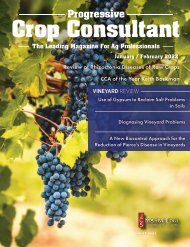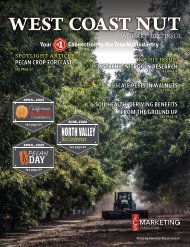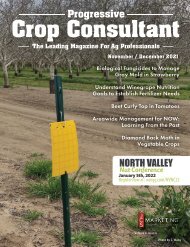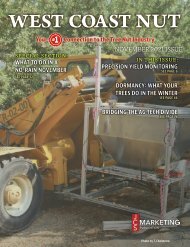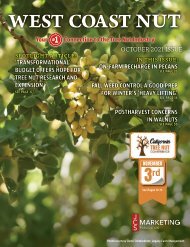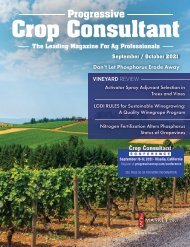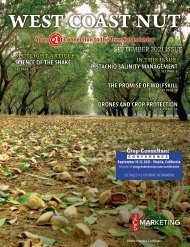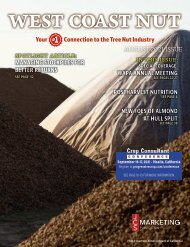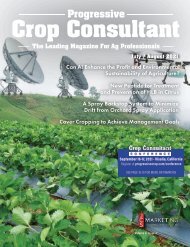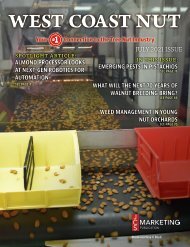WCN Dec e
Create successful ePaper yourself
Turn your PDF publications into a flip-book with our unique Google optimized e-Paper software.
START THINKING ABOUT<br />
POLLINATOR CONTRACTS<br />
BEEKEEPERS SAY CONTRACTS ARE<br />
WELCOMED ‘SOONER RATHER THAN LATER’<br />
By CECILIA PARSONS | Associate Editor<br />
Harvest is over. Mummies are<br />
shaken and swept. Is it time to<br />
think about almond pollination?<br />
According to bee brokers and<br />
beekeepers, tighter supplies this year<br />
and increasing demand for pollination<br />
services mean almond growers need to<br />
contract for hives early and plan ahead<br />
for their arrival in the orchards.<br />
In addition to costs, hive numbers and arrival time, beekeepers need to know if the<br />
hives will be secure from theft, if pesticide applications will be made, if there is a water<br />
supply and the timing of payments (photo by Marni Katz.)<br />
New Era of Pollinator Contracts<br />
Denise Qualls, a bee broker with<br />
Pollination Connection, said contracts<br />
with growers are welcomed sooner<br />
rather than later to ensure an adequate<br />
honeybee supply. Some almond<br />
growers do book early, she said, but<br />
for the most part, growers don’t think<br />
about bees until after harvest. Many<br />
contracts are signed in <strong>Dec</strong>ember and<br />
January, but bees are still being booked<br />
in February.<br />
Qualls said the days of a handshake<br />
to secure pollination service might be<br />
over.<br />
“Most growers and brokers now<br />
have written contracts that spell out<br />
terms for pollination services including<br />
price, delivery time and hive strength,”<br />
Qualls said. Conditions spelled out in<br />
the contract can ensure the grower receives<br />
the pollination service necessary<br />
for setting a crop. The contract also can<br />
ensure beekeepers are fairly compensated<br />
for their time and investment in<br />
healthy, strong hives.<br />
Verbal agreements worked back<br />
when hives were renting for less than<br />
$100 and far fewer acres of almonds<br />
were grown. Now, Qualls said, demand<br />
for strong hives to cover all almond<br />
ground in the state requires that both<br />
sides agree on exact terms and put<br />
them in writing.<br />
Josette Lewis, chief scientific officer<br />
with Almond Board of California<br />
said ABC recommends growers sign<br />
contracts for pollination service. There<br />
needs to be clear understanding and<br />
communication between the growers<br />
and beekeeper. A sample contract is<br />
available at ABC’s website<br />
Number of full frames per hive is a<br />
key element in a contract, Lewis said.<br />
A third party inspector can verify the<br />
hive strength for the grower. County<br />
Agricultural Commissioners’ offices<br />
should provide inspector information.<br />
Working Together<br />
Steve House, director of operations<br />
at California Almond Pollination<br />
Service, said once a grower finds a<br />
good beekeeper and a beekeeper finds a<br />
good grower, they each have an integral<br />
component in their supply chain and<br />
a major factor in the success of their<br />
businesses. Both parties need to understand<br />
the success of one depends on the<br />
success of the other.<br />
In addition to costs, hive numbers<br />
and arrival time, House said beekeepers<br />
need to know if the hives will be<br />
secure from theft, if pesticide applications<br />
will be made, if there is a water<br />
supply and the timing of payments.<br />
Important considerations for almond<br />
growers are hive strength and<br />
confirmation of arrival time in the<br />
orchard, generally no later than 5%<br />
Continued on Page 58<br />
56 West Coast Nut <strong>Dec</strong>ember 2021




